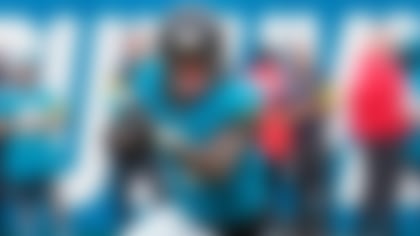The Ravens didn't just draft quarterback Joe Flacco's replacement. They drafted Flacco's opposite in Lamar Jackson, an almost uncomfortable repudiation of an excellent era of Ravens football that has experienced increasingly diminishing returns.
Flacco's former No. 1 receiver, Steve Smith, unofficially started the clock on the end of the old Ravens when he joked -- as he checked his watch in the final moments of NFL Network's broadcast of Round 1 -- that Flacco "might be just like us. About five more minutes until we're outta here." General manager Ozzie Newsome made his final draft pick on Saturday, and coach John Harbaugh could need a playoff appearance this season to keep his gig. In another reminder of how quickly fortunes can change in the NFL, one could argue that Jackson arrives in Baltimore with more job security than the Ravens' Super Bowl-winning head coach and quarterback.
Flacco, whose contract will be far easier to dump after the 2018 season, was hardly the only veteran to suffer collateral damage during the weekend of the 2018 NFL Draft. Below is a list of other NFL players who were hurt by the draft:
Carlos Hyde, RB, Cleveland Browns: It wasn't a great sign for Hyde when the Browns drafted bruising running back Nick Chubb with the No. 35 overall pick. It got even worse when Browns executive Alonzo Highsmith said Chubb "exemplifies what we're trying to build."
Whereas Hyde is always looking for the big play, Chubb takes what the defense gives him and then takes a little more. Hyde could wind up being the highest-paid No. 3 running back in the league at $5 million, playing behind Chubb and passing-down svengali Duke Johnson.
Jeremy Hill, Mike Gillislee and Rex Burkhead, RBs, New England Patriots: Foxborough looked like a great place for Hill to resuscitate his career after being displaced in Cincinnati. Instead, he and last year's flier running back, Mike Gillislee, could be battling for a roster spot that doesn't exist. Rex Burkhead's guaranteed money and James White's third-down chops ensure their status as quality role players, while first-round pick Sony Michel's (No. 31) comprehensive skill set will limit their chances of gaining bigger roles.
Shane Ray, OLB, Denver Broncos: General manager John Elway's 2015 first-round draft pick has struggled to get snaps as a pro, partly because of talented teammates, partly because of injuries and partly because of struggles defending the run. No. 5 overall pick Bradley Chubb is anything but one-dimensional, which should leave Ray fighting against Shaq Barrett just to be next up in the team's pass-rushing rotation. It would be a surprise if Ray remains on the Broncos' roster in 2019.
Mike Glennon and Sam Bradford, QBs, Arizona Cardinals: It was impossible for this year's draft to go worse than last year's for Glennon, who, having signed with Chicago, was attending the Bears' team-sponsored draft party last April when he found out his new employers were adding his future replacement, Mitchell Trubisky. No one is going to feel sorry for Glennon after he earned $16 million from the Bears last year and received a $4 million signing bonus from the Cardinals this offseason, but he probably experienced flashbacks when Arizona traded up to draft Josh Rosen 10th overall.
Glennon's status as the team's backup is particularly in doubt because of Rosen's pro-ready skill set. Rosen showed the accuracy, anticipation and natural feel in the pocket at UCLA that could have him ready to play earlier than most rookie quarterbacks. That is also bad news for the Cardinals' presumed starter, Sam Bradford, who was limited in the team's first minicamp. Now more than eight months removed from a mysterious knee injury that ruined Bradford's 2017 season in Minnesota, there are questions about how much longer Bradford's career will last. Any missed snaps for Bradford in the offseason or training camp will make it harder for him to establish himself in a new city and new system, giving Rosen the chance to start as early as Week 1.
The Cardinals paid Bradford $15 million guaranteed, but Glennon learned last year that amount of money doesn't guarantee playing time. It's apparently the going rate for a team looking for a temporary fix at quarterback, even if that temporary period only lasts for the weeks between free agency and the draft.
Trae Waynes, CB, Minnesota Vikings: Throughout the 2017 season, the narrative surrounding Waynes was that the former first-round pick was no longer the Vikings defense's weak link. Then the NFC Championship Game happened. Whether or not Waynes' rough performance in Philadelphia was solely responsible for the team drafting cornerback Mike Hughes (No. 30) in the first round, it's hard to ignore what the pick means for Waynes' future. The Vikings exercised the fifth-year option on Waynes' rookie contract, but there are too many other core Vikings players to pay in the long-term, so Waynes will likely get his second pro contract elsewhere.
Jonathan Stewart, RB, New York Giants: GM Dave Gettleman defended the drafting of Saquon Barkley at No. 2 overall by saying that Stewart, Barkley's new teammate, hasn't lost anything after 10 NFL seasons. Running backs can last! But if they lasted like quarterbacks, the Giants wouldn't have needed Barkley in the first place.
Stewart is used to getting the ball, having posted at least 200 touches in each of the last four years. But Barkley's three-down skill set should turn Stewart into a mentor and insurance policy. Since Stewart doesn't have special teams value, he could eventually wind up being inactive on game days.
Mohamed Sanu, WR, Atlanta Falcons: Anyone who watches the Falcons knows Sanu's value goes beyond the box score, but he's only averaged 678 yards in two seasons as the team's No. 2 wideout. Sanu fits better as a third option behind Julio Jones and new pickup Calvin Ridley (No. 26), still providing exceptional toughness and versatility even if his numbers go down.
Teddy Bridgewater, QB, New York Jets: Just look to the contract. Bridgewater was only able to attract $500,000 guaranteed from the Jets and will have to show he's healthy this summer just to make the team. Third overall pick Sam Darnold is the future, veteran Josh McCown is the interim starter/QB whisperer and Bridgewater is facing another uphill battle after spending the last two years fighting back from his knee injury.
Jacquizz Rodgers, RB, Tampa Bay Buccaneers: Did you know that Rodgers, a journeyman entering his eighth season, was Tampa's presumptive starting running back entering the draft? GM Jason Licht looked determined to change that, using the first of his three second-round draft picks to take USC burner Ronald Jones (No. 38), a human highlight reel who offers the sizzle Rodgers lacks.
Dak Prescott, QB, Dallas Cowboys: On one theoretical hand, it was time to say goodbye to veteran receiver Dez Bryant (released) and tight end Jason Witten(expected to retire). On the other hand, the one made of flesh and bone, with the Cowboys spending their first two picks on a linebacker (Leighton Vander Esch, No. 19) and guard (Connor Williams, No. 50), Prescott's top targets in 2018 are led by Terrance Williams, Cole Beasley and third-round rookie receiver Michael Gallup (No. 81).
Ameer Abdullah, RB, Detroit Lions: The Lions are determined to fix their running game, using a first-round pick on a center (Frank Ragnow, No. 20) and trading up in the second round to select running back Kerryon Johnson (No. 43). The team even drafted a fullback in the seventh round (Nick Bawden, No. 237). What all this activity means for Abdullah, last year's primary runner, probably goes without saying. Lions GM Bob Quinn pointed out that Johnson can run better on the outside than people realize, which doesn't leave much room for Abdullah. With Theo Riddick also in the mix, Abdullah could be battling LeGarrette Blount just to make the team.
Samaje Perine and Rob Kelley, RBs, Washington Redskins: Everyone who says it's easy to find running backs should look at the Redskins over the last few years. Whether it was diminishing returns from Alfred Morris, workmanlike runs from Kelley or Perine's erratic rookie season, they haven't found an early-down runner to believe in. The arrival of Derrius Guice (Round 2, No. 59) changes that. Guice runs with the same effort and aggression that makes Kelley so likable, but with the breakaway ability of a young Marshawn Lynch.
Follow Gregg Rosenthal on Twitter @greggrosenthal.












